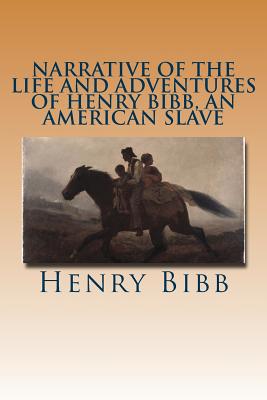Narrative of the Life and Adventures of Henry Bibb, an American Slave

Narrative of the Life and Adventures of Henry Bibb, an American Slave
Narrative of the Life and Adventures of Henry Bibb, an American Slave is a classic African American history and slave biography by Henry Bibb. Henry Walton Bibb (May 10, 1815 in Cantalonia, Kentucky - 1854) was an American author and abolitionist who was born a slave. After escaping from slavery to Canada, he founded an abolitionist newspaper, The Voice of the Fugitive. He returned to the US and lectured against slavery. Bibb was born to an enslaved woman, Milldred Jackson, on a Cantalonia, Kentucky, plantation on May 10, 1815. His people told him his white father was James Bibb, a Kentucky state senator, but Henry never knew him. As he was growing up, Bibb saw each of his six younger siblings, all boys, sold away to other slaveholders. As a young teenager, Henry Bibb was sold to a man in Newcastle, Kentucky, named Mr. Vires, whose wife treated Bibb poorly. Recalling the abuses he received in that household, Bibb says that the Vires' cruelty inspired him with a desire to escape. He would run away for days at a time, and though they would beat him for it, he never gave up. Eventually they grew tired of his escapes and returned him to his original slaveholder, Mr. White. In 1833, at the age of eighteen, Henry Bibb was introduced to his future wife, Malinda, a slave who lived in Oldham County, Kentucky on a farm four miles from Bibb. At first he was reluctant to get romantically involved with her because he knew that such a relationship would impede his aspirations to freedom, but the more he spent time with her, the more he was distracted from his goals. Though everyone except for Malinda's owner opposed their union, they entered into a common-law marriage since legally binding marriages were a privilege withheld from slaves by most slaveholders. After marrying Malinda, Bibb was moved from farm to farm until, because of fear that he would run away to see his wife, he was contracted to labor for the Malinda's slaveholder. He quickly became disturbed at seeing the abuses that his wife was subjected to, and even more so once Malinda gave birth to their daughter, Mary Frances, who was likewise abused. In December of 1837, Bibb made another, more successful, bid for freedom. He left his wife and child without their knowledge and crossed the Ohio River into the free state of Indiana. From there he took a steamboat to Cincinnati, all the while hiding his identity from those onboard. In 1842, he managed to flee to Detroit, from where he hoped to gain the freedom
PRP: 45.34 Lei
Acesta este Prețul Recomandat de Producător. Prețul de vânzare al produsului este afișat mai jos.
40.81Lei
40.81Lei
45.34 LeiLivrare in 2-4 saptamani
Descrierea produsului
Narrative of the Life and Adventures of Henry Bibb, an American Slave is a classic African American history and slave biography by Henry Bibb. Henry Walton Bibb (May 10, 1815 in Cantalonia, Kentucky - 1854) was an American author and abolitionist who was born a slave. After escaping from slavery to Canada, he founded an abolitionist newspaper, The Voice of the Fugitive. He returned to the US and lectured against slavery. Bibb was born to an enslaved woman, Milldred Jackson, on a Cantalonia, Kentucky, plantation on May 10, 1815. His people told him his white father was James Bibb, a Kentucky state senator, but Henry never knew him. As he was growing up, Bibb saw each of his six younger siblings, all boys, sold away to other slaveholders. As a young teenager, Henry Bibb was sold to a man in Newcastle, Kentucky, named Mr. Vires, whose wife treated Bibb poorly. Recalling the abuses he received in that household, Bibb says that the Vires' cruelty inspired him with a desire to escape. He would run away for days at a time, and though they would beat him for it, he never gave up. Eventually they grew tired of his escapes and returned him to his original slaveholder, Mr. White. In 1833, at the age of eighteen, Henry Bibb was introduced to his future wife, Malinda, a slave who lived in Oldham County, Kentucky on a farm four miles from Bibb. At first he was reluctant to get romantically involved with her because he knew that such a relationship would impede his aspirations to freedom, but the more he spent time with her, the more he was distracted from his goals. Though everyone except for Malinda's owner opposed their union, they entered into a common-law marriage since legally binding marriages were a privilege withheld from slaves by most slaveholders. After marrying Malinda, Bibb was moved from farm to farm until, because of fear that he would run away to see his wife, he was contracted to labor for the Malinda's slaveholder. He quickly became disturbed at seeing the abuses that his wife was subjected to, and even more so once Malinda gave birth to their daughter, Mary Frances, who was likewise abused. In December of 1837, Bibb made another, more successful, bid for freedom. He left his wife and child without their knowledge and crossed the Ohio River into the free state of Indiana. From there he took a steamboat to Cincinnati, all the while hiding his identity from those onboard. In 1842, he managed to flee to Detroit, from where he hoped to gain the freedom
Detaliile produsului










